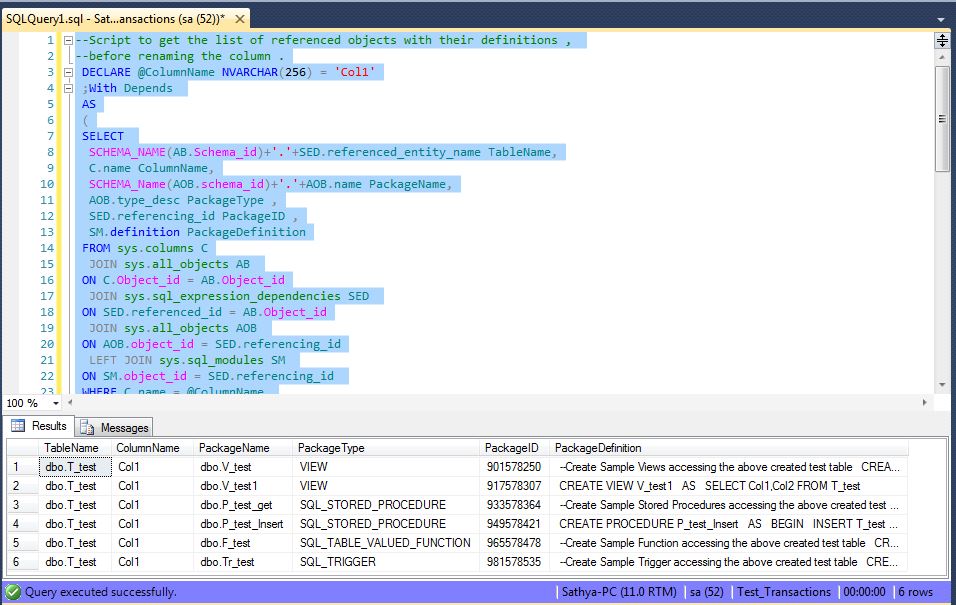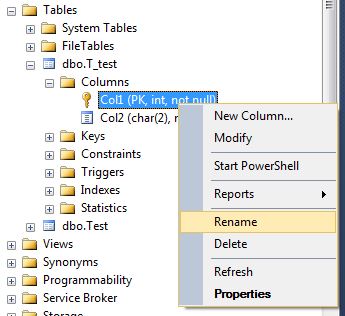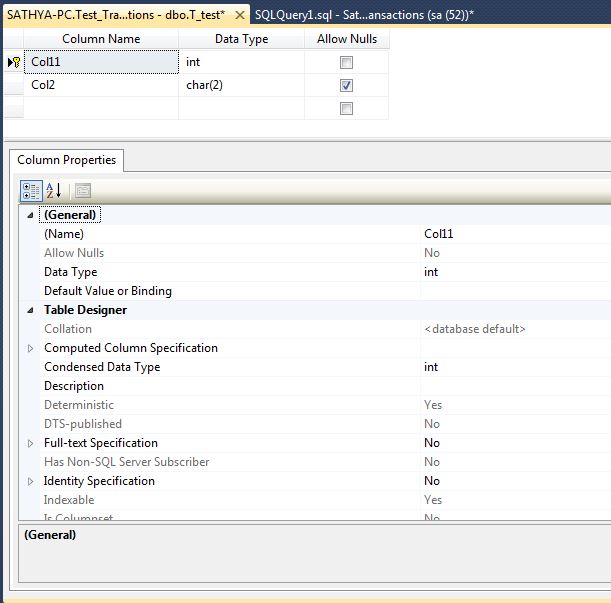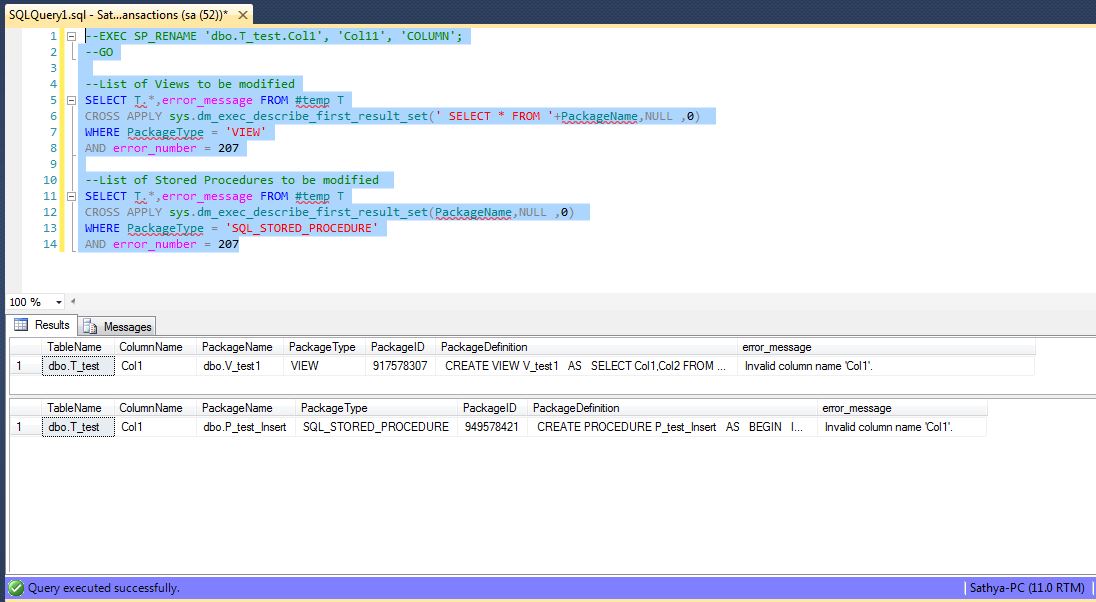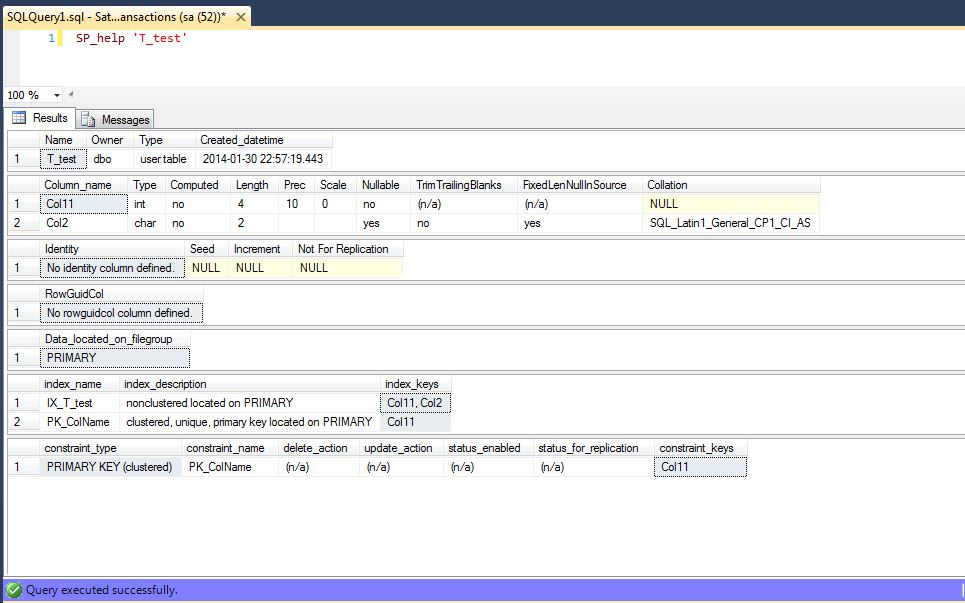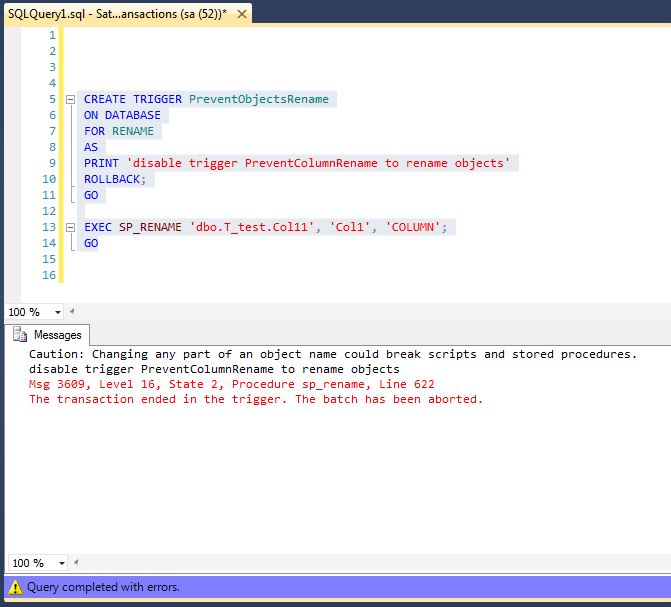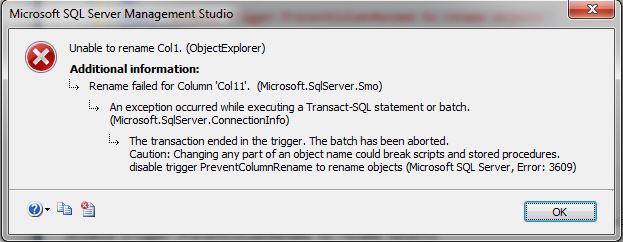Note
Access to this page requires authorization. You can try signing in or changing directories.
Access to this page requires authorization. You can try changing directories.
This article is about the impact of renaming a column of a table .
Introduction
As mentioned in MSDN BOL, renaming a column will not automatically rename references to that column. You must modify any objects that reference the renamed column manually.
Suppose there is a situation where you rename a column in the middle of your development. When we rename the column we will notice the below caution message in SSMS after successfully renaming that column :
Caution: Changing any part of an object name could break scripts and stored procedures.
As clearly mentioned in the warning message, we should take care of column naming in the referenced Stored Procedures, Views , triggers and functions.
Let us walk through the effect of renaming a column with the below sample scripts:
--Create Sample table
CREATE TABLE T_test (Col1 INT NOT NULL ,Col2 CHAR(2))
GO
--Create Sample Views accessing the above created test table
CREATE VIEW V_test
AS
SELECT * FROM T_test
GO
CREATE VIEW V_test1
AS
SELECT Col1,Col2 FROM T_test
GO
--Create Sample Stored Procedures accessing the above created test table
CREATE PROCEDURE P_test_get
AS
BEGIN
SELECT * FROM T_test
END
GO
CREATE PROCEDURE P_test_Insert
AS
BEGIN
INSERT T_test (Col1,Col2)
SELECT 1,'A'
END
GO
--Create Sample Function accessing the above created test table
CREATE FUNCTION F_test(@Col1 INT)
RETURNS @ret TABLE
(
Col1 INT ,
Col2 CHAR(2)
)
AS
BEGIN
INSERT @ret
SELECT Col1,Col2 FROM T_test
RETURN;
END;
GO
--Create Sample Trigger accessing the above created test table
CREATE TRIGGER Tr_test
ON T_test
AFTER DELETE
AS
RAISERROR ('Notify - No Auditing Implemeted', 16, 10);
GO
--Create Primary key & NonClustered index
ALTER TABLE T_test
ADD CONSTRAINT PK_ColName PRIMARY KEY CLUSTERED (Col1);
GO
CREATE NONCLUSTERED INDEX IX_T_test
ON T_test (Col1,Col2);
GO
Scripts to Identify all Referenced Objects affected by Column Rename
--Script to get the list of referenced objects with their definitions,
--before renaming the column
DECLARE @ColumnName NVARCHAR(256) = 'Col1'
; With Depends
AS
(
SELECT
SCHEMA_NAME(AB.Schema_id)+ '.' +SED.referenced_entity_name TableName,
C. name ColumnName,
SCHEMA_Name(AOB.schema_id)+ '.' +AOB. name PackageName,
AOB.type_desc PackageType ,
SED.referencing_id PackageID ,
SM.definition PackageDefinition
FROM sys.columns C
JOIN sys.all_objects AB
ON C.Object_id = AB.Object_id
JOIN sys.sql_expression_dependencies SED
ON SED.referenced_id = AB.Object_id
JOIN sys.all_objects AOB
ON AOB.object_id = SED.referencing_id
LEFT JOIN sys.sql_modules SM
ON SM.object_id = SED.referencing_id
WHERE C.name = @ColumnName
)
SELECT * INTO #temp FROM Depends
UNION ALL
SELECT SCHEMA_NAME(T.Schema_id)+'.'+Object_name(AOB.parent_object_id),
C. name ,
SCHEMA_NAME(AOB.Schema_id)+ '.' +tr. name ,
AOB.type_desc PackageType ,
AOB.object_id,
SM.definition
FROM sys.triggers Tr
JOIN sys.all_objects AOB
ON AOB.Object_id = Tr.Object_id
JOIN sys.columns C
ON C.object_id = AOB.parent_object_id
JOIN sys.tables T
ON T.Object_id = C.Object_id
JOIN sys.sql_modules SM
ON SM.object_id = Tr.Object_id
WHERE C.name = @ColumnName
SELECT * FROM #temp
Ways of Renaming a Column of a Table
Object Explorer - > Table - > Columns - > Right-Click - > Rename
Right-Click on a Table - > Design - > Edit the column name
T-SQL Script to rename a column
EXEC SP_RENAME 'dbo.T_test.Col1', 'Col11', 'COLUMN';
GO
Error Number - 207
Note if we had used " * " instead of explicitly mentioning the columns in the above scripts, column renaming would not have any impact on the referenced objects.
What happens if we did not mention the column names explicitly inside batch scripts ?
What is error number - 207 ?
Scripts to Identify Referenced Objects that are affected by Column Rename and need modification
--EXEC SP_RENAME 'dbo.T_test.Col1', 'Col11', 'COLUMN';
--GO
--List of Views to be modified
SELECT T.*,error_message FROM #temp T
CROSS APPLY sys.dm_exec_describe_first_result_set(' SELECT * FROM '+PackageName,NULL ,0)
WHERE PackageType = 'VIEW'
AND error_number = 207
--List of Stored Procedures to be modified
SELECT T.*,error_message FROM #temp T
CROSS APPLY sys.dm_exec_describe_first_result_set(PackageName,NULL ,0)
WHERE PackageType = 'SQL_STORED_PROCEDURE'
AND error_number = 207
Note that the Key columns in Primary key constraints and Indexes will be automatically renamed when a column is renamed.
Note that we cannot rename a column with a check constraint created using that column .
CREATE TABLE T_test1
(
City varchar (255)
CONSTRAINT chk_Person CHECK (City='Chennai')
)
GO
EXEC SP_RENAME 'dbo.T_test1.City', 'Citys', 'COLUMN';
GO
Msg 15336, Level 16, State 1, Procedure sp_rename, Line 497
Object 'dbo.T_test1.City' cannot be renamed because the object participates in enforced dependencies.
Avoiding Renaming of Objects using DDL Triggers
We can prevent renaming objects using DDL triggers.
CREATE TRIGGER PreventObjectsRename
ON DATABASE
FOR RENAME
AS
PRINT 'disable trigger PreventColumnRename to rename objects'
ROLLBACK ;
GO
EXEC SP_RENAME 'dbo.T_test.Col11', 'Col1', 'COLUMN';
GO
Note : We cannot rename a column even in the Object Explorer if we have a DDL trigger enabled for the RENAME event type .
--Drop all sample objects created for this demo
DROP TABLE T_test,T_test1
DROP VIEW V_test,V_test1
DROP PROCEDURE P_test_get,P_test_Insert
DROP FUNCTION F_test
DROP TRIGGER Tr_test
DROP TRIGGER PreventObjectsRename ON DATABASE
Related Reference links
- SQL Server 2008 - Table and Database Designers
- sys.dm_exec_describe_first_result_set
- sys.sql_expression_dependencies
- Sql Server - Object dependencies
- Sql Server - DDL triggers & EVENTDATA() function
- DDL Triggers
See Also
